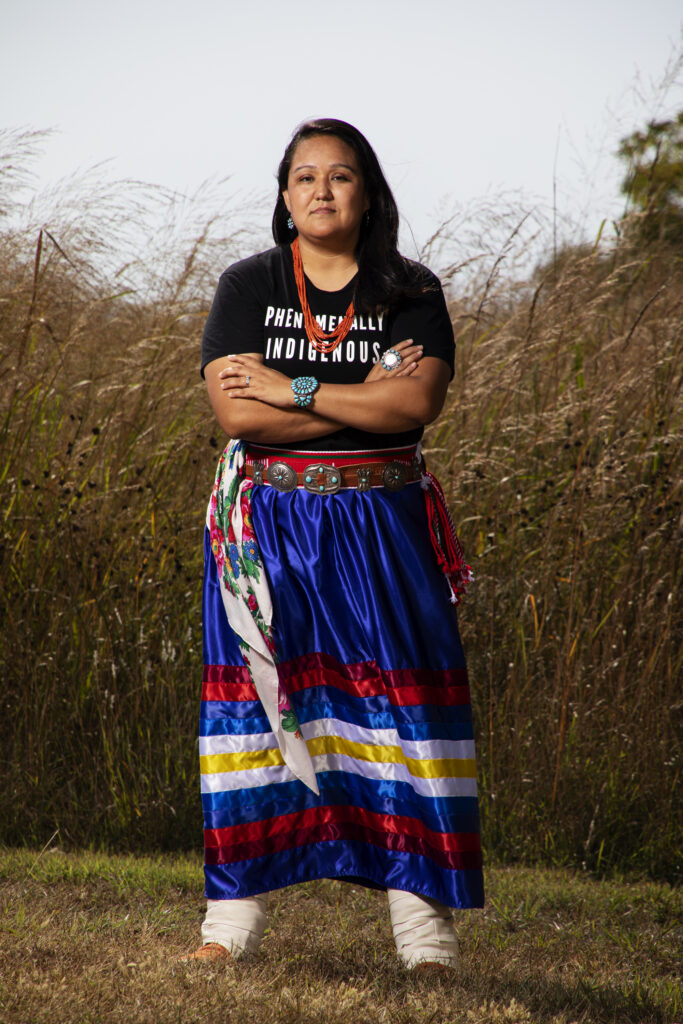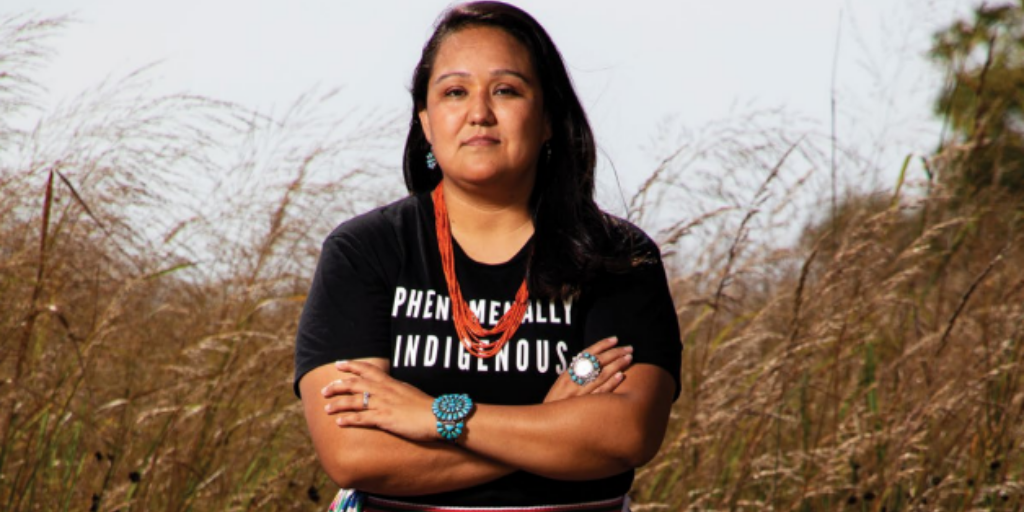By Evan C. Loving
Born and raised on the Navajo Nation, Melissa Peterson is of the T ł ‘ízí lání clan (Many Goats) and born for the Todích’íí’nii clan (Bitter Water). Peterson’s professional career is grounded in advocacy for Native Americans through her numerous community and faculty leadership roles at the University of Kanas (KU). She joined KU in 2015 as the multicultural community coordinator in the Officer of Diversity and Inclusion and has risen through the ranks to Director of Tribal Relations. Additionally, Peterson serves as the adviser for KU’s First Nations Student Association (FNSA), President of the Native Faculty and Staff Council, and organizer of the KU FNSA Powwow & Indigenous Cultures Festival. Outside of KU, Peterson is also the Associate Executive Director for the Kansas Association of Native American Education (KANAE).
For her significant contributions to Indian Country and Native Americans in Lawrence County, Peterson was named to The National Center for American Indian Enterprise Development’s 2022 class of Native American 40 Under 40 award recipients.
Peterson earned her bachelor’s degree in community health from Virginia Commonwealth University in 2008, holds a Master of Public Health degree from the KU Medical Center, and anticipates completing her Doctor of Education in Educational Leadership and Policy Studies – Higher Education Administration from KU.

Melissa Peterson, Director of Tribal Relations at The University of Kansas. (credit: Laura Kingston)
Can you tell us about your role as Director of Tribal Relations?
As the Director of Tribal Relations, I lead the Office of Native American Initiatives where we support the academic success of Native American students at KU and those who take classes at KU from Haskell Indian Nations University. I also work with Native Nations on behalf of our institution. Currently, I serve on the Kansas Advisory Council for Indigenous Education Working Group (KACIE-WG) which is led by our Native Nations in partnership with the Kansas Department of Education. In addition, I am currently leading our repatriation efforts while we search for a Repatriation Program Manager. Really, both areas of my role are interconnected and lend to each other.
How has the COVID 19 pandemic shaped or shifted your work in Tribal relations?
My role as Director of Tribal Relations started during the pandemic so I had to balance our Native Nations and its citizens, many students, and their ability to interact with our campus or have access to interact with our campus. Our communities were hit pretty hard with COVID 19 and many of our reservations were shut down from outsiders. So, we lost many students who would rather return home and be with family or assist their communities to combat COVID 19. As our institution went back to in-person instruction, Haskell was still virtual and so was much of Indian Country.
How did you begin your journey as an advocate and activist for Indigenous peoples within Kansas and beyond?
Through my interactions with the community, Native and non-Native, there always seems to be the need for advocacy for Indigenous peoples. I naturally advocate through educating and now that I think back on that, I have always advocated for Indigenous people when I traveled off the reservation. But since coming to Kansas to coach at Haskell, I fell in love with the potential of our Native existence in Kansas and in my Lawrence community.
When you’re not working how do you find joy and/or fulfillment?
My family brings me joy, especially my daughter. She fills my cup so I’m able to offer more during work. Also, my wife not only supports me, but she pushes me to be the best. I also enjoy tv shows, movies, and working outside, either in the yard or with the animals. Working outside reminds me of growing up on the reservation and I feel closer to my family back in Arizona.
Who are some of the mentors who have positively impacted your work?
My grandmother, though deceased, has always been and continues to be a mentor for me. I do all things because of her strength and guidance. Other mentors include women who have taken their time to guide me or give me a chance to shine: Gwynn Grant (high school coach), Lisa Wolf-Wendel (current advisor), Gretchen Heasty (director of TRIO), Susan Klusmeier (vice provost for academic success), and Elizabeth Kronk-Warner (former KU faculty, current law school dean).
In fact, the way Dr. Kronk-Warner offered space for me to work on my dissertation really helped guide me to success. If I I were to translate her actions into advice for others, it would be “take the time to sit with a student, your presence could be everything they needed to succeed.”
What support do you need from KU and Lawrence community to make your work more impactful in 2023?
Work in my office has been on “highly go fast” and I hope it does not slow down, but if it does, I want our community to keep Indigenous people relevant, not just in November or October, but all year. Weaving Indigenous ways of knowing into our everyday actions will be an important aspect to the enhancement of Jayhawks Rising, our institutions strategic plan.
Can you offer a few words of wisdom to the rising leaders overcoming challenges in 2023?
If I am not doing the work myself, I cannot expect others to follow me and trust in me. So, as you confront challenges in 2023, do not be afraid to do the work. T’áá hwó’ ají t’éego, which means “it is up to you” in the Navajo language.
POWER 40 Under 40 is now available. Read it here



